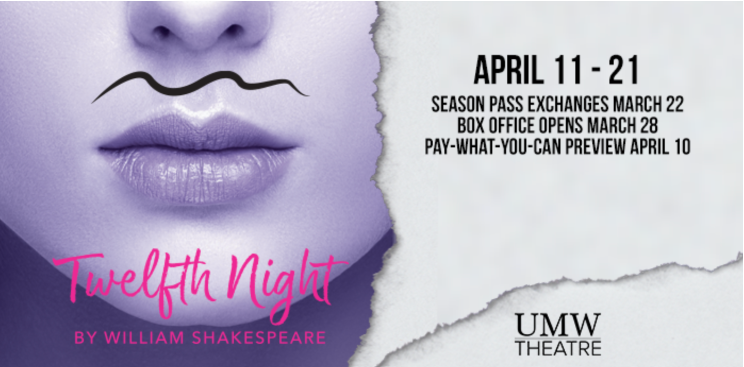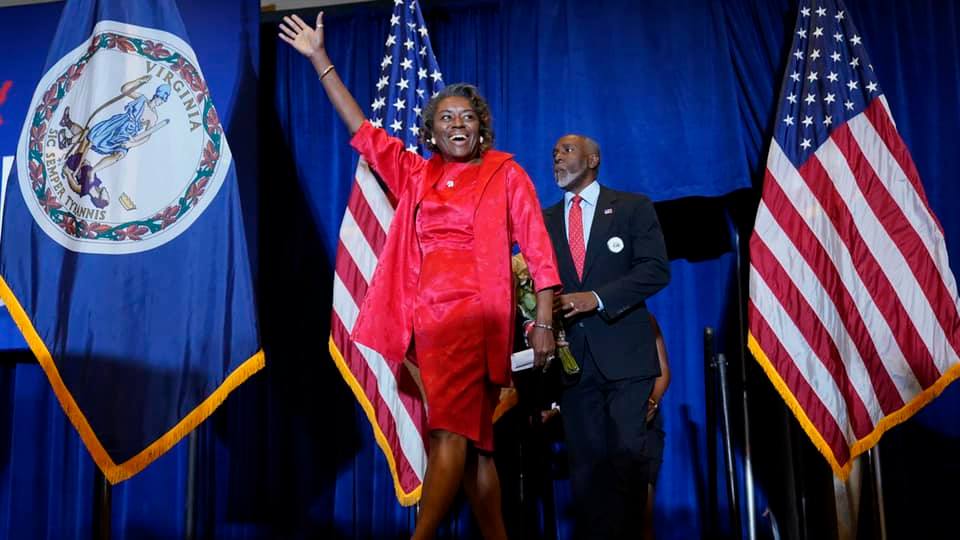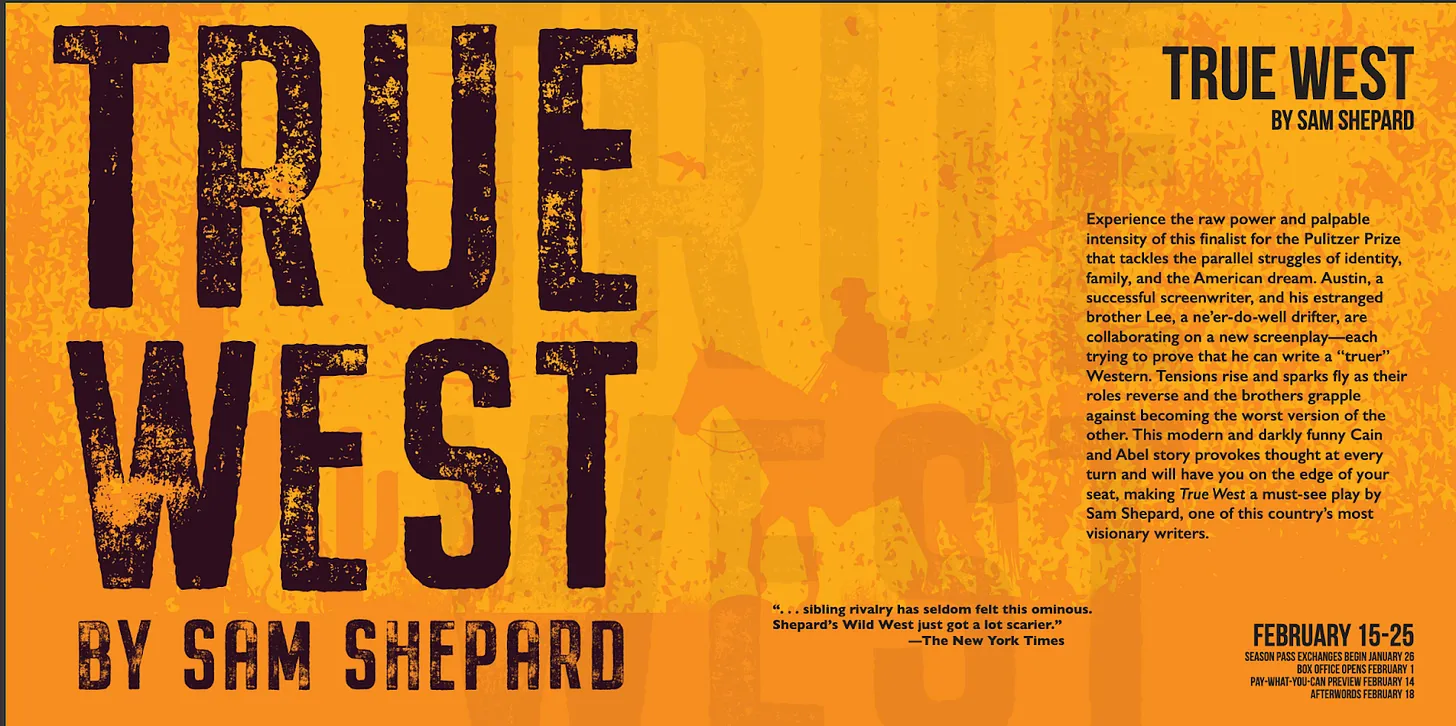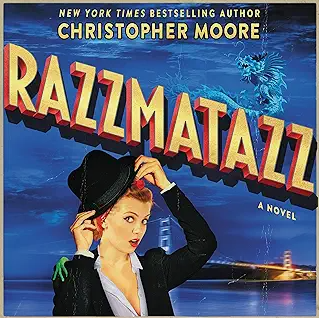
TWELFTH NIGHT
by William Shakespeare
Presented by UMW Theatre, directed by Marc Williams
Tickets $23.00- $28.00
By Dennis Wemm
THEATRE CRITIC
So the play happens to be 422 years old, written in a mix of early modern English prose and poetry, sprinkled with songs until it’s almost a musical comedy. It deals with cross-dressing, the mistakes people make in recognizing each other, and the expectations we have of others. It tells an improbable story that stretches out over three months of Twelfth Night time. The performances slide in and out of the world of the play through the entire performance; characters talk to each other and then to themselves without the other characters leaving the scene (what Deadpool fans love about breaking the fourth wall has been around since ancient Greece). This is the trivia that surrounds what happens to be a rather strong production of a deceptively simple script.
Okay, the language is kind of old-there are a couple of updates with gendered pronouns to fit the casting and characterization. I will tell you the secret to enjoying the language in Shakespeare plays: Will loved to pack all of the complex explanations into the first 15-20 minutes of the play. After that it gets lots easier, and in the hands of an accomplished cast, it sounds like people talking, okay? These actors are accomplished.
The main plot is simple: girl loses brother in a convenient shipwreck, girl dresses as a man, girl gets job, girl falls for the boss, girl is assigned to woo boss’s chick, boss’s chick falls for the girl (man), everybody else longs for the boss, the boss’s chick, or the girl (man’s) brother who also survived the shipwreck. Everybody has a team that is in competition with all the other teams. Each team has its own plotline. Comedy ensues. Here’s the lineup:
Team Orsino: The melancholy duke himself (played by Mason Michael Clark); Cesario (actually Viola in disguise as a man); courtiers Curio and Valentine; various guards, officers, and attendants.
- Team Olivia: Olivia (Emma Manger) is not really just “the boss’s chick” but a powerful and independent successful woman; Maria (Alex Lagon); Malvolia (Emily Kile), Olivia’s second in command; various ladies and servants.
- Crossing both of these teams and interwoven in all the plots we have Team Toby. Sir Toby Belch (who is aptly named) (Seth Drenning); Maria (who is both Toby’s partner in crime and in affection and Olivia’s lady in waiting), Sir Andrew Aguecheek (Lee Adams), Feste the Jeste (Kyleigh Friel), and Fabia (a very reasonable Nikki Rizzo).
- And a very confused priest (Mary Robinson).
- Off on their own until needed: Sebastian (Viola’s identical twin brother-played by Nathaniel Huff); and Antonio (Cameron Zakreski) who rescued Sebastian but is a fugitive from the Duke’s justice.
Don’t worry, it will all end happily and contentedly for all concerned. “If you can’t be with the one you love, love the one you’re with…”
Extreme characters in extreme situations are a staple of great comedy. Extremely melancholy characters will be made to laugh at themselves, Puritans will be shown to be not as puritanical as they like, and fools will be shown to be foolish even though they will never get any wiser. We get to see them learn to our delight.
The play is suffused with Celtic acoustic music by very visible musicians, who also accompany Feste through various songs from the original. Most of the songs are about the sadness of winter. These moments provide an emotional spine for the action to follow. Clearly the Duke is lost in his depression, he loves the lady Olivia who spurns his advances. She’s just as sad as the Duke, but over the death of her brother. The genius of the play is that it turns the extremes of sadness on their heads by making the sadness seem an unhealthy block to love.
Malvolia is unpleasantly critical to any kind of foolishness, and she sees foolishness in everyone but herself. It’s easy to see that she’ll turn into the butt of many jokes: this character is in many office-based TV sitcoms. Some clever pranks will teach them a lesson (not). Shakespeare is unflinchingly fair to his characters.
Staging is a simple unit set that is decorated with an abstract landscape, the shapes of Illyria’s countryside are broken down into outlines and suffused with light. Its shades are well-washed blues and grays that support the play’s wild shifts of mood well. It’s equally countryside, the inside of a ducal court, the seacoast, or a foundering ship.
The soundscape of the play is environmental: almost subliminal waves, dripping water, wind and other effects create a counterpoint to the words which are clearly presented by the actors.
Acting is tight and emotionally real; timing is excellent. Actors slide out of the “real” worlds of the play and talk with the audience. I liked that they focused on faces in the audience and not into a general empty space above the audience’s heads. It was like the characters were seeking connection and approval for what they were explaining. Every moment on the stage was suffused with energy and connection.
All of the main characters were strongly portrayed. By that I don’t just mean “they were good when they talked.” Each main character was watchable both in moments when the staging was focused on them and when they shared attention with the rest of the stage.
Lee Adams’s Sir Andrew Aguecheek stole laughs with perfect timing in the same way Laurie Metcalf does in The Connors. Baylor’s Viola took every opportunity to show her passion for Orsino when no one was looking or paying attention. Olivia is not just the object of extreme affection, she shows extreme affection herself just not for the guy who feels it for her. Sir Toby’s swaggering walk betrayed both his inebriation and his ego. We get to watch fully rounded human beings who also happen to be hilarious because of their extremity. For the first time, I not only laughed at Orsino but actually cared about him. Ditto Antonio. Ditto Sebastian. Kyleigh Friel’s Feste was not only a capable clown but a powerful singer. I actually cared when Malvolia left the stage in anger over being duped.
I have personally directed or acted in this play five times and seen it many more. I’m a Twelfth Night fanboy. This production showed me more of the characters than any other production I’ve seen.
Kudos also to director Marc Williams for bringing together a team that underscored the action well and staging the action. Stage pictures were always evolving from one to the next, and I was always focused on the moment where the action was most important. Even though the characters were draped in shades of white the staging was never a blank page.
Yes, you should go and see this play, which runs weekends through April 21 in the Klein Theatre at Mary Washington University.
Dennis Wemm is a retired professor of theatre and communication, having taught and led both departments at Glenville State College for 34 years. In his off time he was president and sometimes Executive Director of the West Virginia Theatre Conference, secretary and president of the Southeastern Theatre Conference, and generally enjoyed a life in theatre.





